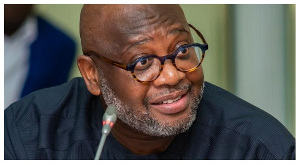The Secretary-General for the International Chamber of Commerce Ghana, Emmanuel Doni-Kwame has acknowledged that phytosanitary issues are becoming a canker for Ghana to permeate the global market, as products that don’t meet standard requirements can lead to a total rejection of that product by a country.
“I realized that most of the rejection of our agricultural produce was as a result of some individuals who try to send some substandard goods into the European Union, and once they raise a red flag, all products from that country including those which have gone through the right channels are banned,” he revealed.
He entreated the Ghana Export Promotion Authority, to ensure all exporters go through the right standardization channels so that compliant exporters do not suffer.
“So you need to, as GEPA, to make sure everyone who is involved in export, go through the right channels,” he said.
The President of the Federation of Ghanaian Exporters (FAGE), Anthony Sikpa who also agreed that Ghana’s agricultural production for export struggles to meet quality and volume requirements, asked GEPA to be up and doing to help farmers meet right standards so their goods would not be rejected on the market.
“We need to work more on standards. I’m sure you are aware that some green vegetables are banned. It is simply because we were not able to comply with the standards required. And it is not that, the farmers do not want to do it. Sometimes they do not know how to do it so they need to be taught,” he added.
He suggested that a rule should be introduced where all producers for export would have to buy seeds and plant parts from a certified source.
“We need to come up with a rule that if you are producing for export every planting material and input has to be from a certified source,” he stated.
He, however, explained that because standards are not valued in the local market, exporters who also produce for local market, find little motivation to go through expensive standardization measures to come up with wholesome products for both the local and international market.
“It’s not everything that you produce that will go to the export market, some will be sold here. So most buyers don’t value the trouble one has to go through to bring the right product because in the market you can’t differentiate between a certified or what is not certified,” he explained.
The Ghana Exports Promotion Authority said it has been recently collaborating with the Ministry of Agriculture to bring up measures that revive the vegetable exportation sector and make Ghana’s vegetable acceptable on the international market.
Emmanuel Doni-Kwame revealed that the ICC Ghana in collaboration with the Ghana Standards Authority is coming up with a program that would reward producers of agricultural good that comply with phytosanitary standards.
Business News of Thursday, 12 September 2019
Source: EOP

















